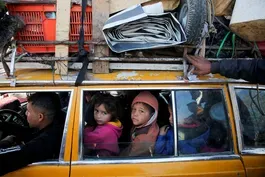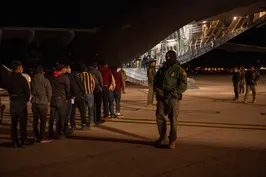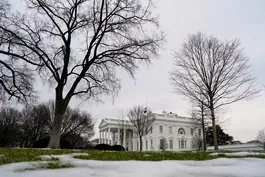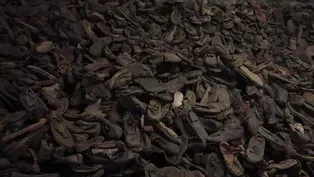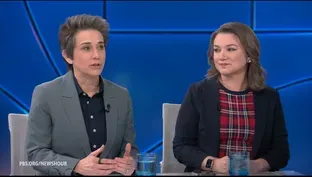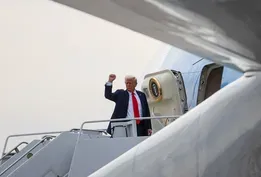
Colombia spat may be sign of Trump's Latin America strategy
Clip: 1/27/2025 | 4m 55sVideo has Closed Captions
Public spat with Colombia could be sign of Trump's Latin America strategy
The U.S. embassy in Bogota canceled appointments for Colombians hoping to get visas to enter the United States. The move was the Trump administration’s response to short-lived resistance by the Colombian government to accept deportation flights. The public spat with a key regional partner could be a sign of how the administration's Latin America strategy will play out. Nick Schifrin reports.
Major corporate funding for the PBS News Hour is provided by BDO, BNSF, Consumer Cellular, American Cruise Lines, and Raymond James. Funding for the PBS NewsHour Weekend is provided by...

Colombia spat may be sign of Trump's Latin America strategy
Clip: 1/27/2025 | 4m 55sVideo has Closed Captions
The U.S. embassy in Bogota canceled appointments for Colombians hoping to get visas to enter the United States. The move was the Trump administration’s response to short-lived resistance by the Colombian government to accept deportation flights. The public spat with a key regional partner could be a sign of how the administration's Latin America strategy will play out. Nick Schifrin reports.
How to Watch PBS News Hour
PBS News Hour is available to stream on pbs.org and the free PBS App, available on iPhone, Apple TV, Android TV, Android smartphones, Amazon Fire TV, Amazon Fire Tablet, Roku, Samsung Smart TV, and Vizio.
Providing Support for PBS.org
Learn Moreabout PBS online sponsorshipGEOFF BENNETT: Today, in Bogota, Colombia, the U.S. Embassy there canceled appointments for Colombians hoping to get visas to enter the U.S.
The move was the Trump administration's response to short-lived resistance by the Colombian government to accept U.S. deportation flights over the weekend.
That public spat could be a sign for how the Trump administration will move forward with its Latin America strategy.
Nick Schifrin is here following the latest.
So, Nick, give us a sense of what unfolded this past weekend and give us an update on where things stand right now between the U.S. and Colombia.
NICK SCHIFRIN: Geoff, this morning outside the U.S. Embassy in Bogota, Colombians expecting to pick up their visas instead picked up this piece of paper saying that their appointments were canceled due to -- quote -- "the Colombian government's refusal to accept repatriation flights of Colombian nationals."
Those deportation flights on military planes, unlike Biden era deportations on commercial or charter planes, began late last week.
The Trump administration said Colombia initially agreed to receive Colombian deportees, but after some Brazilian deportees you see there arrived in handcuffs or reports of poor conditions on the planes, that's when Colombian President Gustavo Petro announced publicly that Colombia would not receive them until they - - quote -- "received dignity and respect."
In reply to that, President Trump threatened 25 percent tariffs that could rise to 50 percent, travel bans, visa revocations, and enhanced inspections on Colombian goods.
And in reply to that, Petro vowed his own tariffs and called President Trump a -- quote -- "enslaver," who was -- quote -- "going to wipe out the human species because of greed."
Now, that is what Petro said.
What he did was cave.
The government now says that it will allow these deportation flights to leave the United States on military planes and land in Colombia.
Trump said the visa restrictions would go into effect and remain in place until that first plane lands, and that's why, Geoff, we saw those lines outside the embassy.
GEOFF BENNETT: Why did Petro reverse course?
Was it the threat of the tariffs?
NICK SCHIFRIN: Well, Petro is a former Marxist fighter turned leftist politician who fought the Biden administration over counter-narcotics policies.
So, to a certain extent, a clash with Trump was inevitable.
But Colombia is economically vulnerable, as your question indicated.
The U.S. is Colombia's largest trading partner, 25 percent, let alone 50 percent.
Tariffs would have destroyed Colombia's economy.
The exports are flowers, crude oil, and coffee.
But the irony is, Colombia is one of, if not the most important partners of the United States in the region.
Former senior Biden officials tell me that Petro cooperated with them on deportation flights, so long as those flights were commercial or charter flights.
And for the last 20 years, the U.S. and Colombia have worked very closely together, including military-to-military cooperation, focused on regional security.
Biden officials told me they received cooperation their priorities, so they tolerated Petro's outbursts, something, Geoff, clearly, Trump is not willing to do.
GEOFF BENNETT: So what does all of this suggest, Nick, about the Trump administration's Latin America strategy?
NICK SCHIFRIN: Trump officials say, from their perspective, from ongoing conversations with Mexico, about the Panama Canal, even in Greenland across the Western Hemisphere, they wanted to make sure that countries understood that they must cooperate with President Trump's priorities, according to Ryan Berg of the Center for Strategic and International Studies.
RYAN BERG, Center for Strategic and International Studies: What the Trump administration, I think, wanted to do was set the tone for other countries, which were looking very closely to see how this would play out.
Mexico was looking closely, Guatemala was looking closely, Panama was looking closely to see if the Trump administration would back down.
And I think they didn't want to set that precedent, which is why they were willing to threaten such high tariffs and such coercive measures.
NICK SCHIFRIN: But Trump's critics, Geoff, tell me that these tactics will be counterproductive.
They could lead to less cooperation in the region, and that could make inroads into the U.S.' global and regional most important competitor, and that is Beijing, says former Mexican Ambassador to the U.S. Arturo Sarukhan.
ARTURO SARUKHAN, Former Mexican Ambassador to the United States: The U.S. historically threw its weight around the hemisphere in sort of what I would call in 21st century or 20th century terms the Trump's Sinatra doctrine.
It's my way or the highway.
But there's a sort of a Monroe Doctrine rehashed, and this at the end of the day may backfire because it may push countries in the hemisphere that have already embraced China because China is its number one trading partner today to sort of run into the arms of Beijing, and it could be counterproductive.
NICK SCHIFRIN: And we will see how this goes, Geoff, beginning this weekend, when Secretary of State Marco Rubio makes the first Cabinet trip internationally, and that will be to Panama.
GEOFF BENNETT: All right Nick Schifrin, our thanks to you, as always.
NICK SCHIFRIN: Thank you.
200,000 displaced Palestinians walk home to northern Gaza
Video has Closed Captions
200,000 displaced Palestinians walk home to northern Gaza after 15 months of war (1m 47s)
Chinese AI startup DeepSeek shakes up the industry
Video has Closed Captions
Chinese AI startup DeepSeek shakes up industry and disrupts financial markets (5m 50s)
Fear spreads in immigrant communities as raids escalate
Video has Closed Captions
Fear spreads in immigrant communities as raids and deportations escalate (6m 46s)
Firing of government watchdogs raises fraud concerns
Video has Closed Captions
Trump's firing of independent watchdogs raises concerns about government fraud and ethics (6m 27s)
Museum preserves shoes of youngest Auschwitz victims
Video has Closed Captions
Museum works to preserve shoes belonging to Auschwitz's youngest victims (7m 48s)
News Wrap: Trump signs executive orders focused on military
Video has Closed Captions
News Wrap: Trump signs executive orders focused on military (5m 31s)
Tamara Keith and Amy Walter on Trump's rapid policy rollout
Video has Closed Captions
Tamara Keith and Amy Walter on Trump's rapid policy rollout and reaction to his first week (7m 19s)
Trump gathers with GOP lawmakers to map out his agenda
Video has Closed Captions
Trump gathers with GOP lawmakers to determine tactics to move his agenda forward (5m 4s)
Providing Support for PBS.org
Learn Moreabout PBS online sponsorshipMajor corporate funding for the PBS News Hour is provided by BDO, BNSF, Consumer Cellular, American Cruise Lines, and Raymond James. Funding for the PBS NewsHour Weekend is provided by...

